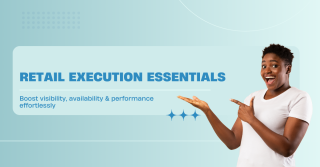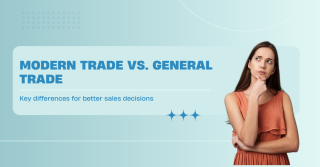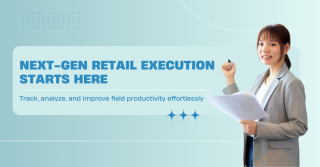How FMCG Giants Like HUL and Nestlé Tackle Field Sales Challenges?
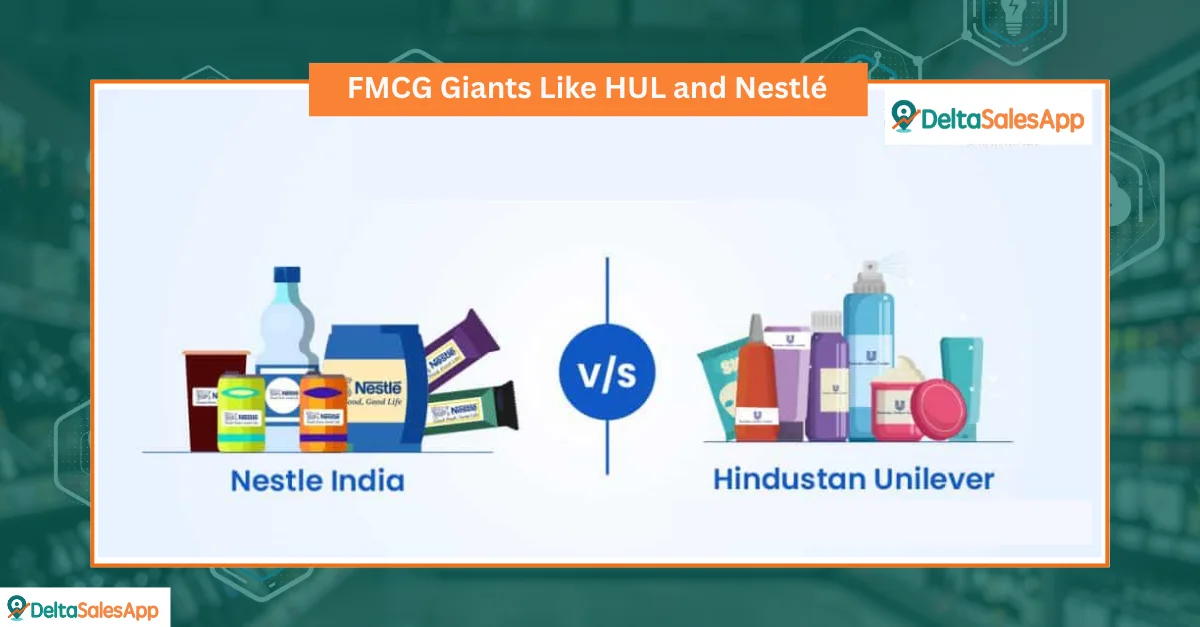
In the fast-paced world of Fast-Moving Consumer Goods (FMCG), visibility and control on the ground aren't just helpful—they're essential. Household names like Hindustan Unilever (HUL), Nestlé, and P&G dominate retail shelves not just because of great products or branding, but because of field sales excellence.
Behind the scenes, these giants run vast sales networks, execute tight beat plans, monitor retail activity in real-time, and constantly tweak performance. And while they’ve invested millions in building such systems, there’s good news: many of their practices are now accessible to growing FMCG brands through modern tech.
Let’s explore how the biggest players tackle field sales challenges—and how you can too.
🧩 The Core Challenges of FMCG Field Sales
Field sales in FMCG is like orchestrating a live concert across thousands of small stages. Whether you're a global giant or a regional player, the operational hurdles are largely the same:
1. Managing a Dispersed Sales Team
Sales reps are constantly on the move—across towns, cities, and rural belts. Ensuring they stick to their routes and hit their daily targets is easier said than done.
2. Lack of Real-Time Visibility
Traditional systems don’t tell you:
Which outlet your rep is currently visiting
What orders are being placed
Where execution gaps exist
This black box problem reduces control and delays interventions.
3. Manual Order Taking
In many cases, field reps still jot down orders manually. This leads to:
Delayed order processing
Miscommunication
Inventory planning issues
4. Inconsistent Beat Plan Execution
Without digital monitoring, reps often skip outlets or rearrange their daily plan based on convenience, not priority. This causes gaps in retail coverage and missed sales.
5. Secondary Sales & Van Tracking Difficulties
Van sales and secondary distribution in rural areas remain underreported. Manual data updates often lack accuracy, making territory-wise performance analysis hard.
In short: Even the best brands grapple with complexity. What separates them is how they’ve optimized their approach.
🏆 How Giants Like HUL and Nestlé Navigate These Challenges
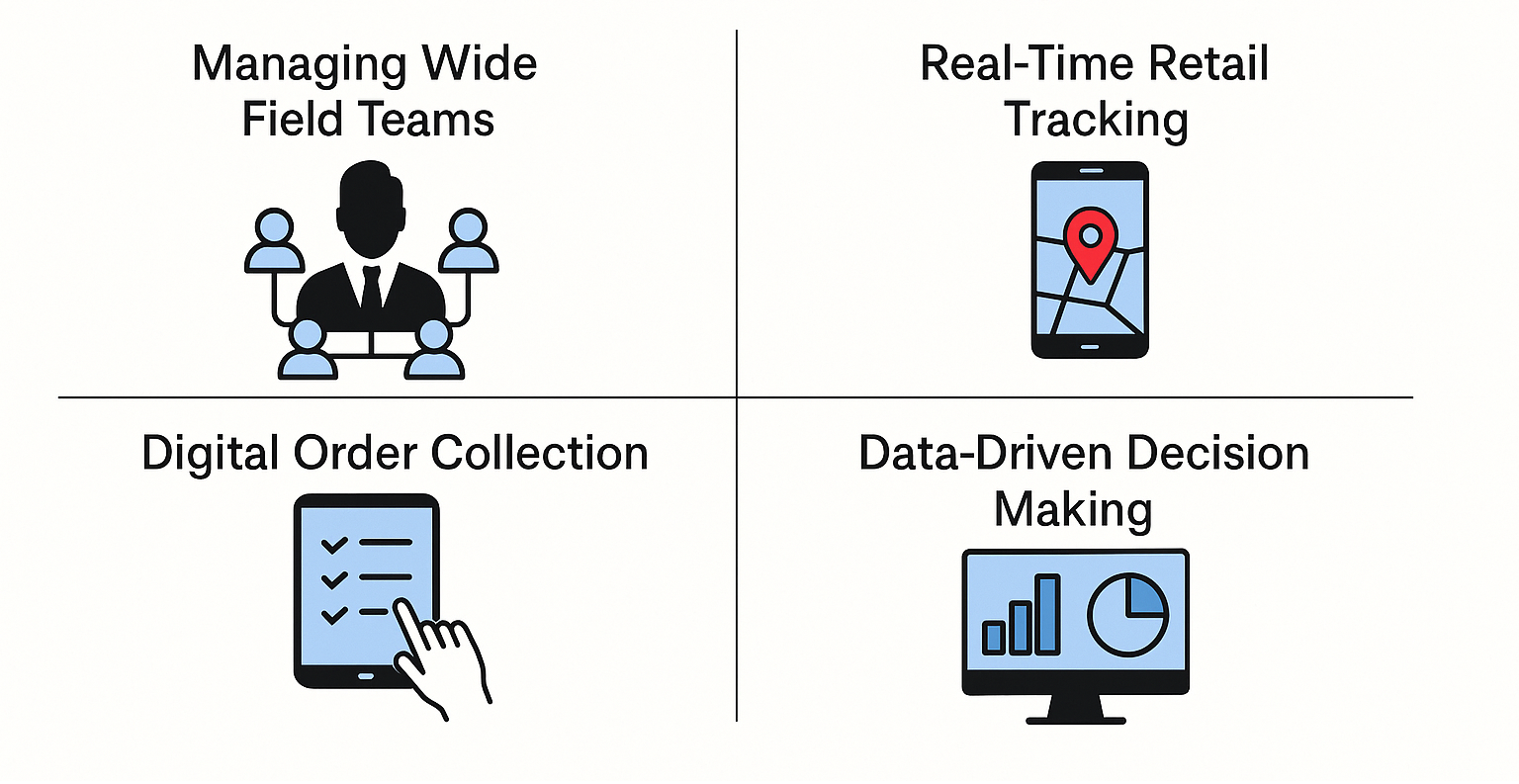
Let’s unpack what global leaders actually do differently—and what systems are behind their unbeatable execution.
🔹 Hindustan Unilever (HUL): The Beat Plan Masters
HUL’s salesforce is one of the most sophisticated in India, especially in terms of beat planning and outlet segmentation.
They:
Define every rep’s route with precision (urban & rural)
Prioritize high-value outlets
Track deviations in beat plans using proprietary apps
Align incentives to field discipline
What You Can Learn:
Create fixed, GPS-based beat routes
Monitor schedule adherence through mobile tech
Segment outlets (A/B/C) based on order potential
🔹 Nestlé: The Rural Distribution Leader
Nestlé India is known for last-mile rural penetration, especially for products like Maggi, Cerelac, and Nescafé.
Their tactics include:
Partnering with local micro-distributors
Using van sales units for deep rural
Monitoring secondary sales in real-time
What You Can Learn:
Adopt van sales tracking via mobile apps
Monitor secondary stock depletion
Use lightweight systems to train and track local distributors
🔹 P&G: Data-Driven Incentive Engine
Procter & Gamble is highly analytical about rep performance. They invest in dashboards that show:
SKU-wise sales trends
Retailer coverage heatmaps
Incentive mapping based on data
What You Can Learn:
Use dashboards to reward performance
Analyze product-level data across territories
Identify underperforming SKUs or reps before targets slip
⚙️ The Technology Shift: How You Can Replicate These Strategies
You don’t need a billion-dollar war chest to achieve this kind of control. With modern sales automation platforms, regional FMCG brands can now plug into the same tactics at a fraction of the cost.
✅ Live Field Tracking
Know exactly:
Which outlet your rep visited
Time spent per visit
Location check-ins with GPS
This improves productivity and discipline while reducing sales leakages.
✅ Digital Order Collection
Ditch the notebooks. Reps can:
Punch orders via mobile
Upload instantly to the backend
Access past order history for upselling
Faster orders mean faster delivery and higher order frequency.
✅ Beat Plan Automation
Pre-load daily routes. If reps deviate or skip outlets, get:
Instant alerts
Route change logs
Missed outlet flags
This boosts outlet coverage and ensures no customer is left out.
✅ Real-Time Dashboards
Access:
Region-wise sales heatmaps
Rep-wise target vs achievement
Product-wise sell-through
Managers no longer wait for weekly updates. They act on today’s numbers, today.
🔍 Case Insight: Big-Brand Moves You Can Replicate
💡 Example 1: Nestlé’s Rural Push
Nestlé trained over 20,000 micro-distributors and synced them to a digital reporting platform. The result?
40% higher secondary sales in untapped villages
Better forecasting of demand in low-density areas
💡 Example 2: HUL’s Shakti Initiative
They turned thousands of rural women into sales agents and equipped them with mobile ordering apps.
Created reach in over 100,000 villages
Reduced cost of rural distribution
You can replicate this by empowering small distributors and tracking their activity digitally.
📈 Why This Matters for Growing FMCG Brands
You may not be Nestlé or HUL — but you're trying to solve the same problem:
👉 "How do I control my salesforce better, move more product, and improve outlet reach?"
With platforms like Delta Sales App, these answers become accessible.
Plug-and-play setup — no custom build required
Flexible pricing — pay as you grow
Easy onboarding — reps learn it in hours, not weeks
📚 Real Results for Regional Players
Local FMCG brands that adopted digital tools saw:
25–30% increase in order frequency
Reduced rep idling time by 40%
Faster order-to-dispatch cycles
Better visibility into non-performing outlets
When execution becomes data-driven, so does growth.
🔑 Final Takeaway: Systems > Size
The real difference between you and an FMCG giant isn’t budget — it’s systems.
They track, measure, and respond instantly.
They’ve systematized field sales.
They win because they execute better, not just because they’re big.
Now, you can too.
💬 Ready to Operate Like the Giants?
If you're building a consumer brand and want to:
Improve outlet reach
Track reps in real-time
Collect more orders
Beat your sales targets
Then sales automation is your next big move.
👉 Book a Free Demo of Delta Sales App
See how regional FMCG brands are scaling like never before — no tech team needed.
Explore more
👉Beat and Route Plan in FMCG Sales
👉Mastering SWOT Analysis for FMCG Success
See What Users Say About Us!
Start your digital transformation with Delta Sales App.

